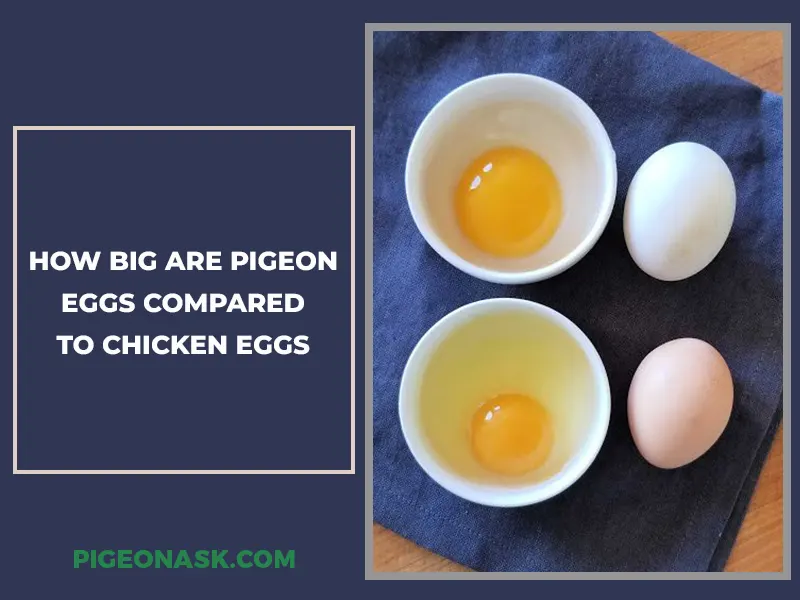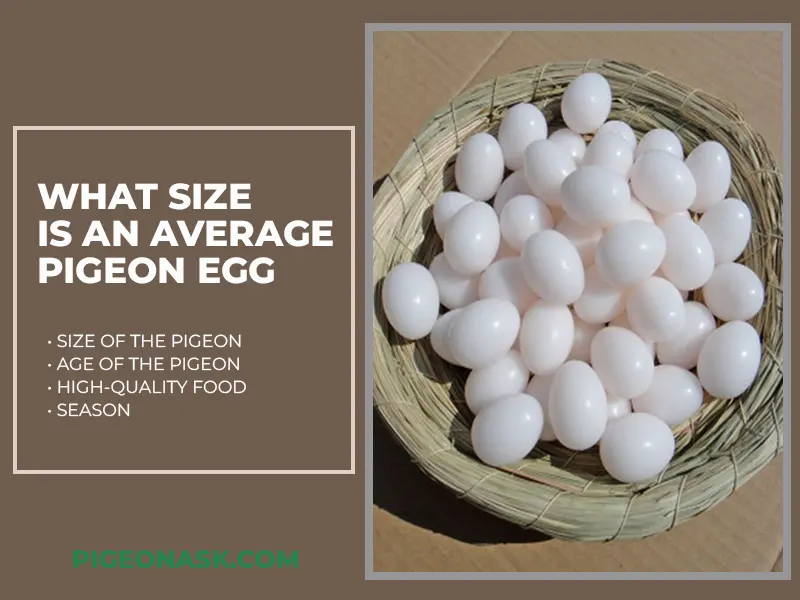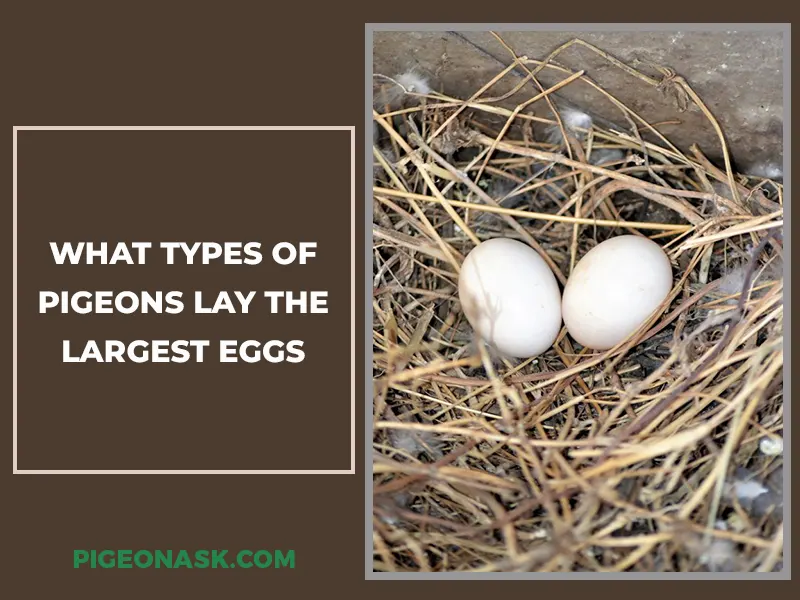How Big Are Pigeon Eggs? 7 Different Species Compared
Although adult pigeons are seen everywhere in the United States, sighting pigeon eggs and baby pigeons is extremely rare. Ever wondered why?
To uncover the secret life of pigeons, let’s address the most basic question.
How big are pigeon eggs? Depending on the species, pigeon eggs are 3 to 4.5 cm (1.18 to 1.77 inches) long and 2 to 3 cm (0.7 to 1.18 inches) wide with a 0.18 mm thin eggshell.
The average weight of pigeon eggs is 15.71 g. Adult large and healthy pigeons that eat high-quality food usually lay bigger eggs.
Read on to discover all about pigeon egg sizes, variations among species, and ways to increase the egg size.
Looking for more articles about pigeon habit:
What Does a Healthy Pigeon Egg Look Like?
A healthy pigeon egg is a fertile egg with an appropriate size and weight. Thankfully, there are some definitive signs of a healthy egg that will produce a proper hatchling.

Here’s what a healthy pigeon egg looks like –
Firm and Smooth Shell Without Blemishes
To understand the health condition of a pigeon egg, you need to examine the appearance of the eggshell first. It should be smooth and free of cracks, bumps, or other blemishes.
A healthy egg should feel firm but not overly hard. If it’s too soft or rubber-like, it might have calcium deformities and not be suitable for incubation.
While the color of the shell can vary depending on the breed of pigeon, it’s typically white or off-white, sometimes with a bluish tint. Any irregular coloration is a bad sign.s
Smell and Weight
A healthy pigeon egg weighs about 15 grams on average. If an egg is significantly lighter or heavier than this, it’s in bad condition.
Besides, if you notice any odor coming from the egg, avoid eating or incubating it, as the egg has surely been damaged or contaminated.
Blood Vessels and Air Sac
Candling an egg is a popular way of testing an egg’s condition. For this, light a candle and turn off every other light in the room. Place the egg against the light and check the internal content of the egg.
You’ll see a growing embryo in the form of a dark mass with discernible blood vessels if the egg is healthy. Also, take a look at the wider end of the egg for a small and intact air sac.
If the air sac is large or ruptured, the egg isn’t healthy.
Learn about pigeon lifestyle in “Pigeon Habits” . We cover their eating, nesting, and interactions with humans.
How Big Are Pigeon Eggs Compared to Chicken Eggs?
Generally speaking, a pigeon egg is about one-third the size of a standard chicken egg.

In one study, the sizes of an adult White Kings pigeon and a White Leghorn layer chicken were compared, and here are the differences in their sizes –
| Feature | Chicken Egg | Pigeon Egg |
|---|---|---|
| Egg Weight | 57.7 g to 60.52 g | 22.57 g to 24.37 g |
| Egg Length | 5.58 to 5.6cm | 3 cm to 4.5 cm |
| Egg Width | 4.47cm | 2 to 3 cm |
| Albumen Height | 6.68 mm | 3.91 mm |
What Size Is an Average Pigeon Egg? – Factors that Affect the Egg Size
On average, most pigeon eggs have a length of 3 to 4.5 cm (1.18 to 1.77 inches) and a width of 2 to 3 cm (0.7 to 1.18 inches). And the eggshell is only 0.18 mm thin, the average weight of a pigeon egg is 15.71 g.

While these measurements apply to most pigeon species, there are slight differences in the egg size depending on several factors. According to a study, here’s what decides the size of a pigeon egg:
Size of the Pigeon
As a general rule, larger pigeons lay bigger eggs as they have more resources (yolk and albumen) to invest in their eggs.
This positive correlation between pigeon size and egg size has been proved by several studies.
For example, one study revealed that the average egg laid by a pigeon
weighing 250 grams was 3.3 cm long, 2.7 cm wide, and 11.8 g heavy.
Meanwhile, a 450 g pigeon lays 4.1 cm long, 3.1 cm wide, and 18.0 g of heavy eggs.
Age of the Pigeon
Older and more mature pigeons lay bigger eggs than younger pigeons who recently reached sexual maturity.
According to the studies, older pigeons are fully developed and more experienced, which probably contributes to the bigger egg size. Also, larger and more mature pigeons lay eggs that hatch into larger chicks.
High-Quality Food
Pigeons who eat high-quality food in a generous amount produce bigger eggs. The size of the egg depends on the amount of its internal content, including the albumin (white portion of the egg) and yolk.
Season
The above-mentioned study reveals an interesting change in the size of the pigeon eggs laid in the winter and in July. While winter eggs are longer and thinner, July eggs are wider and heavier.
What Types of Pigeons Lay the Largest Eggs?
As mentioned above, mature, large, and healthy pigeons who have a nutritious diet lay the largest eggs. However, the key factor that decides the egg size is the species of the pigeon.

Larger species, like the crowned pigeon and Strasser pigeon, produce the largest number of eggs. Below is an egg-size comparison of some of the largest pigeon species –
| No. | Pigeon Species | Egg Length | Egg Width |
|---|---|---|---|
| 1 | Crowned Pigeon | 4.5cm | 3.8cm |
| 2 | Strasser | 4.37cm | 3.14cm |
| 3 | King | 4.36cm | 3.13cm |
| 4 | Pouter | 4.32cm | 3.13cm |
| 5 | Nicobar | 4.3 to 4.8cm | 3.3 to 3.45 cm |
| 6 | Homer | 4.06cm | 3.07 cm |
| 7 | Common Feral | 3.9cm | 2.9cm |
What Size Is a Wood Pigeon Egg?
These medium-sized pigeons lay considerably large eggs with a length of 4.1cm and a width of 3cm.
As for the weight, the eggs weigh up to 18.9g. The pigeons typically lay a clutch of 2 eggs, and the color of the egg is plain white.
While the incubation period is 16 to 17 days, the fledgling period lasts for 28 to 29 days once the eggs are hatched.
What to Feed Pigeons to Increase Egg Size?
Higher calories, protein, fat, vitamins & minerals, amino acids, and linoleic acid are some nutrients that are scientifically proven to increase the egg size of birds.
Let’s take a look at the benefits of these nutrients and what food items contain them –
| Nutrient Name | Benefits | Food |
|---|---|---|
| Protein | Increases the size of egg albumin and yolk | Lentils, sunflower seeds, safflower seeds, peas, beans, soybeans, wheat, and barley |
| High-Calorie Food | Higher calories provide the necessary energy to synthesize larger eggs | Suet, corn, wheat, oats, hazelnuts, dried raisins, and apricots |
| Fat | Produces energy for egg production and increases the weight of the egg | Peanuts, sunflower seeds, hemp seeds, flax seeds, and safflower seeds |
| Amino Acids (Methionine and Lysine) | Promotes faster protein synthesis, larger yolk growth, daily feed intake, and increased egg mass | Lentils, peas, soybeans, cooked egg, wheat, and barley |
| Linoleic Acid (Omega-6 Fatty Acid) | Contributes to cell growth and development, increasing egg weight | Chia seeds, hemp seeds, sunflower seeds, flax seeds, and safflower seeds |
| Vitamins and Minerals | Helps a pigeon grow larger and healthier to produce larger eggs | Leafy greens, sweet potatoes, carrots, oily fish chunks, nuts, seeds, oyster shells, and legumes |
Parting Thoughts
As we’ve explored how big pigeon eggs are, you now know the average egg size and weight of these avians. Although they are typically 3 to 4cm long, these small eggs are highly nutritious.
If you want bigger eggs, consider breeding larger pigeon species, such as the crowned or king pigeon. Another way is to provide high-quality food to the pigeon to promote healthy growth.
Add more protein, healthy fats, and vitamin-rich food to their diet to increase both egg size and egg production.
References
- https://natlib.govt.nz/records/31164965
- https://nexusacademicpublishers.com/table_contents_detail/4/353/html
- https://www.sciencedirect.com/science/article/pii/S1056617119303101
- https://www.ncbi.nlm.nih.gov/pmc/articles/PMC7601574/
